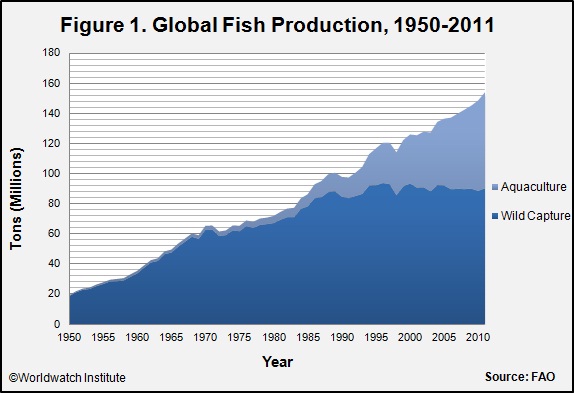The world’s insatiable appetite for fish has pushed wild fish populations to their limits and created an aquaculture industry that’s expected to supply 60% of the world’s fish supply in just 8 years, reports Worldwatch Institute.
Over the past five years, human fish consumption grew 14.4% with Asia consuming at least two-thirds of that. In 2011, global fish production reached a record high of 154 million tons.
As a result, wild fish stocks are at a "dangerously unsustainable level," says Worldwatch. Wild capture accounted for 90.4 million tons of the fish consumed in 2011, up 2% from 2010. Almost 60% of the world’s fisheries are fully exploited – they can’t produce any more fish than we are currently harvesting.
And aquaculture is expected to fill that gap by 2020.

"To maintain the current level of fish consumption in the world, aquaculture will need to provide an additional 23 million tons of farmed fish by 2020," says Worldwatch. "To produce this additional amount, fish farming will also have to provide the necessary feed to grow the omnivorous and carnivorous fish that people want. Aquaculture is being pressured to provide both food and feed because of the oceans’ overexploited fisheries."
The aquaculture contribution grew by threefold last year, and it has grown by tenfold since 1970.
- In 2011, inland aquaculture rose 6.2% to reach 44.3 million tons, while marine aquaculture was up 6.6% to 19.3 million tons.
- In 2010, some 54.8 million people were employed full-time or part-time in capture fisheries or aquaculture.
While aquaculture does help address the problem of overfishing, it creates different sustainable business challenges.
"Growth in fish farming can be a double-edged sword," says Danielle Nierenberg, co-author of the report and director of Worldwatch’s Nourishing the Planet project. "Despite its potential to affordably feed an ever-growing global population, it can also contribute to problems of habitat destruction, waste disposal, invasions of exotic species and pathogens, and depletion of wild fish stock."
More on aquaculture and weighing its efficiency against its environmental impact.
Here’s the Worldwatch report:
